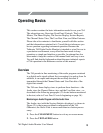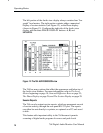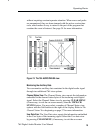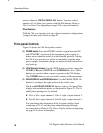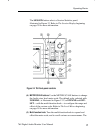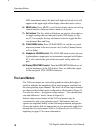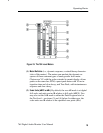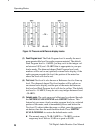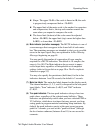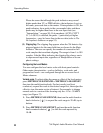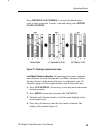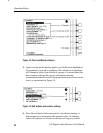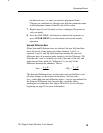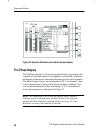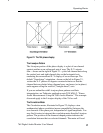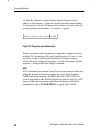
Operating Basics
764 Digital Audio Monitor User Manual
21
H Shape: The upper 20 dB of the scale is linear in dB; the scale
is progressively compressed below –20 dBFS.
H The upper limit of the meter scale is the anchor for expansion
and compression; that is, the top scale number remains the
same when you expand or compress the scale.
H The lower limit (bottom) of the scale cannot be adjusted
below –90 dBFS; the upper limit (top) cannot be higher than
0 dBFS, or lower than –20 dBFS.
(6)
Mute indicator (and other messages). The MUTE indicator is one of
seven messages that can appear in the lower half of each meter
bar. The remaining messages are intended to alert you to possible
errors in the input signal; they are explained in In-Bar Warning
Messages beginning on page 44.
You can specify the number of consecutive all-zero samples
required for a MUTE indication. The default is 10 samples; the
range is 0 to 100. The Mute indicator always reacts to unpro-
cessed input data, regardless of Interpolation or de-emphasis
settings (refer to Interpolation on page 50 or The De-emphasis
Submenu on page 53).
You may also specify the persistence (hold time) for the in-bar
indicators between 1 and 30 seconds; the default is 2 seconds.
(7)
Meter bar labels. The meter bar labels depend on the display mode.
The channel numbers (1, 2, 3, and 4) correspond to the rear-panel
input labels; “Sum” indicates (L+R)/2, and “Diff” indicates
(L–R)/2.
(8)
True peak indicators. The true peak indicators always show true
peak values, regardless of the selected meter ballistics. These
indicators are particularly useful when you have selected PPM or
VU ballistics, which have rise times that may prevent you from
seeing peaks in program material containing steep transients. By
default, the peak indicators persist at the most recent program
peak for 2 seconds; you can set this “peak hold time” (through
the level meters submenu) between 0 and 10, in one-second in-
crements.



